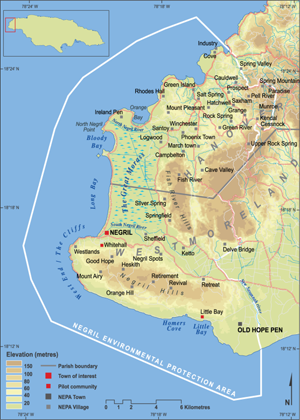project
Dec. 6 2011
Activity
RIVAMP Jamaica: the case of Negril
Project description
The selected local partner for the study was the Planning Institute of Jamaica (PIOJ). The study was initiated in July 2009 and the results of the RiVAMP study were published in a report (UNEP/PIOJ, 2010) launched in Kingston in April 2010. It revealed that the main triggers of beach erosion were the decline of ecosystems (coral reef and sea grass).
The reasons for the decline of these ecosystems are the land-based pollution (deforestation, poor agriculture practices and lack of proper sewage treatment, leading to sedimentation, nutriments and related development of algae and illness for the coral) as well as direct impacts on the reef (inappropriate fishing practices or anchoring), manual removal of sea grass by hotel staff for the comfort of tourists. Climate change and related sea level rise was found to be responsible for 8 % of past beach erosion, however, accelerated sea level rise (ASRL) is a major threat for the future beach erosion. Different impacts on beach erosion were provided under different climate change scenarios.
 Negril beach was once the widest beach in Jamaica Negril beach was once the widest beach in Jamaica |

|

|

|
In order to disseminate the RiVAMP methodology a training material was created. This includes a training manual, training data and free opensource software. You can download this RIVAMP training material.
Map of the study area

